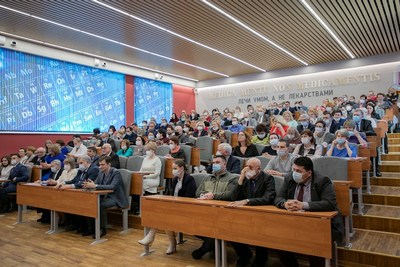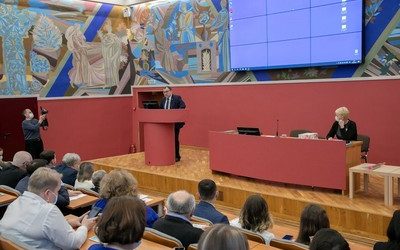 On Monday, March 14, the next meeting of the scientific council of KSMU took place. The event was held in the university’s pharmaceutical building in the classroom No.4. The renovation was completed here quite recently, and now it looks more like a museum of the history of medicine: there are pictures on the walls, which recreate the plots on the topic of healing; there is a print in the form of the Periodic Table of Chemical Elements of D.I. Mendeleev on the blinds.
On Monday, March 14, the next meeting of the scientific council of KSMU took place. The event was held in the university’s pharmaceutical building in the classroom No.4. The renovation was completed here quite recently, and now it looks more like a museum of the history of medicine: there are pictures on the walls, which recreate the plots on the topic of healing; there is a print in the form of the Periodic Table of Chemical Elements of D.I. Mendeleev on the blinds.
The meeting of the Academic Council began with a solemn part. On behalf of the staff of the university, Rector V.A. Lazarenko congratulated Professor V.I. Baranov, Head of the Department of Ophthalmology, and Professor S.V. Povetkin, Head of the Department of Clinical Pharmacology, on the anniversary, presenting them Letters of Appreciation.
Victor Anatolyevich also presented the employees of KSMU the awards of the Ministry of Science and Higher Education of the Russian Federation, the Governor of the Kursk Region, the Kursk Regional Duma, and regional departments.
According to the results of the research conducted by the Department of Statistics and Expertise of OOO “ExpertmediaGroup” in the territory of the Russian Federation, Kursk State Medical University is included in the official register of laureates of the Russian-wide competition “The Best Educational Institutions of the Russian Federation – 2022”. The university was awarded a diploma and a commemorative medal.
During the official part, the members of the Academic Council discussed topical issues of the development of the university. The analytical report «Digital Transformation of KSMU: Realities and Prospects» was presented by Associate Professor Vasily Gavrilyuk, Vice-Rector for Educational Activities and General Issues.
Digital transformation is one of the primary national goals, the deadline for its implementation is until 2024. The advantage of digital transformation is in improving the quality of control and analytics, optimizing the work of employees. The University is successfully implementing an information system based on 1C “UniversityPROF”. Thus, during the admission campaign in 2021, 13578 applications of applicants were quickly and qualitatively processed with the help of digital technologies. And from September 1, 2023, paper student cards and credit books will become a thing of the past. They will be completely replaced by electronic analogues. The introduction of digital technologies is one of the main directions in the educational activities of the university. The rector V.A. Lazarenko noted that for that purpose in our university there were all resources.
Deputy Director of ICE Associate Professor S.A. Dolgareva made a presentation on “Current issues of development and implementation of electronic educational resources within the framework of continuous professional development”. It was a question of prospects of development of continuous medical and pharmaceutical education in the light of requirements of digitalization. It is necessary to continue the development and timely updating of electronic educational resources, including materials on simulation training, to optimize the system of registration of students on the services “NMFO Online” and fpk.office.
The Chief Accountant of the Department of Economic and Social Affairs I.S. Kostanova made a report on the “Results of financial and economic activities of KSMU for 2021”. During the report, the issues of implementation of the May presidential decrees, the introduction of digital technologies and others were discussed.
The information message “On increasing the publication activity, improving the scientometric indicators of the university staff” was delivered by the head of ERB, Professor I.I. Bobyntsev.
The participants of the meeting of the Academic Council were shown the exhibition «Achievements of university science in solving current problems of medical education», located in the hall of the pharmaceutical building, prepared by the staff of the library of KSMU. The exhibition presents the latest publications of the university staff: electronic resources prepared at the departments to ensure the educational process, printed educational publications for all areas of training, numerous monographs and scientific publications of the staff in periodicals, author’s abstracts of theses.

